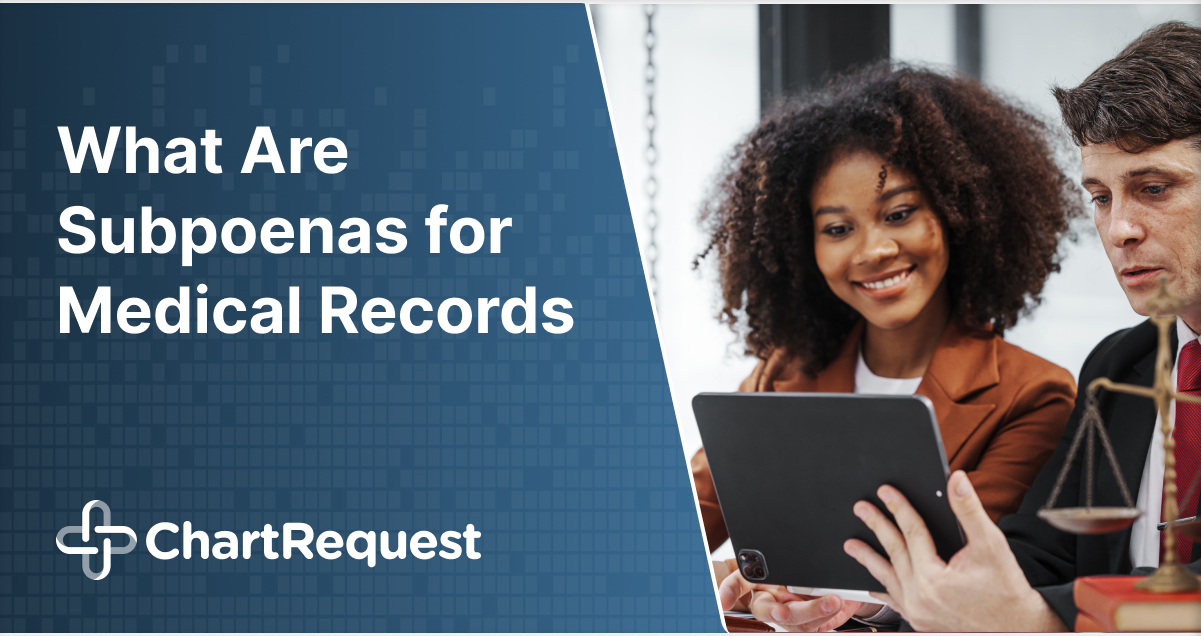When medical records contain the key to winning a case, they can become key evidence in court. To get them, legal professionals can send a subpoena to a healthcare facility requesting a copy of the records.
If you are a patient, healthcare provider, or legal professional in this situation, you may wonder what this entails. This article will cover the essentials of subpoenas to help you understand the requirements, protections, and more.
Table of Contents
- What is a subpoena?
- What medical information will the court discuss?
- How do judges create a court order?
- What if you don’t want to release your records?
- Requesting medical records for court

What Is a Subpoena?
There are many types of legal cases that can require medical records. The most common include medical malpractice, insurance fraud, workers compensation, and some criminal cases.
If your medical records are legally relevant, there are two ways for them to end up in court.
- The first is signing a release of information authorization form for a lawyer or judge.
- The second is retrieval by a subpoena or court order.
A subpoena is a legal request attorneys, court clerks, and other legal professionals send to request relevant documents and/or an appearance to testify. For medical records, requestors will be using either the “records only” or the “appearance and records” types subpoena.
When a legal professional sends a subpoena to a healthcare provider, they must follow HIPAA regulations regarding the lawful release of medical records. To remain compliant, they must follow a protocol before sharing medical information.
This generally includes:
- Signature verification. A subpoena with a signature from a judge, magistrate, or administrative tribunal becomes a court order. A court order carries more weight than regular subpoenas; healthcare providers must release medical records requested with a court order.
- Time for the patient to decline the release of information. When they receive a subpoena, healthcare providers must adhere to the notification requirements of the Privacy Rule outlined by HIPAA. Patients may object to a subpoena but not a court order.
- The exact records relevant to the request. Healthcare providers must adhere to the Minimum Necessary Standard. This requires them to only release the minimum records necessary to fulfill a request, so you will know the exact scope of your records being shared.
Back to the Table of Contents.
What Medical Information Will the Court Discuss?
When legal professionals use medical records in court, HIPAA laws still take precedence. Covered entities can share only medical information immediately relevant in court, which varies case-by-case.
When determining legal protocol when responding to a subpoena, healthcare providers must follow the most strict between state and federal laws regarding the exchange of protected health information.
This means that every provider must adhere to the limits set by HIPAA when a subpoena requesting medical records pertaining to:
- Mental health
- Psychiatric and/or psychotherapy
- Substance abuse
- Genetic information
- HIV-AIDS information
Such medical records cannot be released in most cases, and neither a request from the patient nor a subpoena from an attorney is sufficient. Healthcare providers can release these records with a signed court order, but they will not make the contents of these records available.
Back to the Table of Contents.
How Do Judges Create a Court Order?
To be considered for a court order, a lawyer must explain how evidence within specific medical records is necessary to prove a case.
For example, suppose a lawyer sought to retrieve psychiatric records to fish out character flaws to defame your character. In that case, there’s no way a judge would provide a signature to bypass subpoena limitations.
Unlike on television, surprises are not generally welcome in a court of law. To prevent “trial by ambush,” both parties must present every piece of evidence they collect for a legal case to both the judge and the other party in a process called discovery. This allows time for the other party to either object to a subpoena request or seek answering evidence.
During discovery, if you object to a subpoena request, the other party may escalate the request and appeal to the judge to create a court order. As such, there is no surefire way to guarantee your medical records will not be released. There is, however, a guarantee that they will be used responsibly.
Judges, like all covered entities, are bound by HIPAA regulations to safeguard the distribution of your protected health information. When legal professionals disseminate medical information in court, it will be limited to the Minimum Necessary Standard just like the initial release of information.
Back to the Table of Contents.
What if You Don’t Want to Release Your Records?
When a legal professional creates a subpoena for medical records, the records cannot legally be released unless one of the following is true:
- The person issuing the subpoena has notified the patient of the subpoena and explained their right to object. They must provide a written statement and supporting documents that prove this. If nobody objects, the healthcare provider can release the records on the date provided.
- All parties involved in the lawsuit have agreed to a qualified protective order. The person issuing the subpoena must provide a written statement and supporting documents that prove this.
- The patient has provided a signed a HIPAA authorization form for the release of the specific medical records outlined in the subpoena.
The only above method that doesn’t directly involve the patient’s willful release of the records is the first. In this case, a patient’s failure to respond to the notice by the subpoena deadline leaves the decision up to the healthcare provider who has the requested medical records.
In this case, the healthcare provider has legal obligations to release the requested records. However, if the healthcare provider believes the medical records are irrelevant to the case, they can object. To do so, they must provide a written letter providing their reasons for not releasing the documents.
Once a subpoena has been declined, the judge must review the response and determine if a court order is necessary. Healthcare providers can usually only overturn a court order if the records can be proven not to be applicable.
Back to the Table of Contents.
Requesting Medical Records For Court
Whether you are a patient seeking to retrieve medical records for an upcoming court case or a legal professional requesting on behalf of a client, ChartRequest can help you get your medical records without a subpoena.
Skip the long prerecorded phone directories and enjoy the transparency only ChartRequest can offer.


